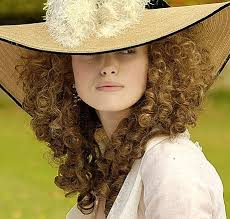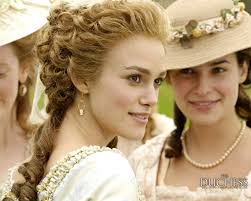
My second task in the PERIOD DRAMA CHALLENGE has been completed. I watched the BBC 1995 mini-series THE BUCCANEERS. I’m still working on the category THROUGH THE CENTURIES and I’m going to go back in time month after month. I started with
CHARLOTTE GRAY, a movie set in the 20th century, during WWII, so this time I'll take you back to the 19th century: 1873.

I think that to be brief and direct I may just say that watching this mini-series was a delight. But this is not enough for a proper review, isn’t it? However, you must believe me. It is an amazing costume drama.
THE BUCCANEERS is the last novel written by
Edith Wharton. It was unfinished at the time of her death in 1937, and published in that form in 1938. After careful study of the synopsis and notes, Wharton scholar Marion Mainwaring finished the novel, which was published by Viking Press in 1993. Independently, the same year the BBC hired screenwriter Maggie Wadey to adapt and finish the novel for a television serial adaptation, which was produced by the BBC and American PBS broadcaster WGBH, and As a result the novel has two different endings.
The story opens in Newport , R.I., in the U.S.A. in 1873 and focuses on the life experiences and love affairs of four daughters of new money: Virginia and Annabell (Nan) St. George and their friends Lizzy and Conchita. After the arrival of a British governess who has to take care of the St. George girls, Laura Testvalley, their lives get in touch with British aristocracy, their old-styled stiff manners and narrow – minded way of thinking. One of them, Conchita, gets engaged with Lord Richard who will take her to his home in England but soon gets tired of her when he discovers she is not as rich as he believed. All the girls move to England on a sort of formation journey with their governess...they are going to invade England, as the English invaded their native country long ago: they are the new Buccaneers.

The story follows the buccaneers' rocky lives through marriage, pregnancy, affairs and divorce, focusing particularly on the fate of the youngest, most idealistic girl, Nan St. George, and her governess and mentor, Laura Testvalley. The young women struggle with modernity and tradition, conformity and rebellion. And how do they end up?
Once in England, the American girls begin to conquer the British bachelors. Lizzy sets up the engagement between Virginia St. George and Lord Seadown - much to the chagrin of his passionate mistress Idina Hatton. But Lord Seadown is only intersted in Virginia’s money and she will discover the disappointing terrible reality as soon as they got married. Julius, the Duke of Trevenick, proposes to a confused and love-torn Nan St. George. In fact, she loves Guy Thwarte but he must leave the country for two years to make his fortune and, though in love with her, can’t promise her nothing: “He wants to make his fortune not to marry one”. Lizzie Elmsworth marries the rising MP Hector Robinson. Conchita receives more and disturbing news from her roaming husband, Lord Richard who deserts and neglects her.
My favourite characters are, of course, Nan (
Carla Gugino) and Guy (
Greg Wise). Their love story is really involving and Nan’s character is so passionate, brave, strong-willed and anti-conformist that you can’t remain indifferent. She accepts the marriage proposal of Julius, Duke of Trevenick and becomes a duchess when she is only eighteen. She has to endure appalling disillusion: no fairy-tales but boredom and dissatisfaction at Trevenick. She will be even raped by her childish selfish husband, will lose her baby, will be forced to accept her golden prison. In the end, however, she will have the courage to pursue freedom and love creating a scandal.
The best moment in the series is when Nan and Guy run away together from a party leaving all their acquaintances speechless and astonished. To comment this scene I'll use Laura's, Nan's governess, words :"When I saw Nan and Guy run away together I needed to scream out loud. I don't know if it was envy or fear. But it was like... it was like to see them take a leap into space."



 The writer Jimmy McGovern (same author as recent BBC series MOVING ON) tells the story behind the Gunpowder Plot in two parts, each centred on one of the monarchs.
The writer Jimmy McGovern (same author as recent BBC series MOVING ON) tells the story behind the Gunpowder Plot in two parts, each centred on one of the monarchs.

.jpg)












